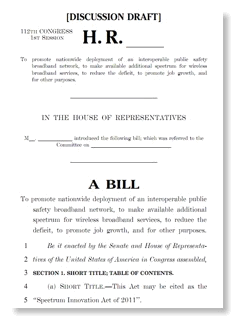Spectrum Innovation Act of 2011:
Will the Party in Favor of Section 104 Please Stand Up?
The draft deals with several topics. FastNetNews published a Republican staff memo which is a good summary. The Republican staff summarizes the bill’s contents as:
The first is a discussion draft that authorizes an as yet unspecified amount for construction of an interoperable public safety network on the 24 MHz of spectrum cleared for public safety by the 2005 DTV legislation, creates a governance structure for construction and operation of the public safety network, and authorizes incentive auctions.
However, what got a lot of attention at Thursday’s meeting was Section 104 which the staff described as follows:
Requires that any spectrum made available for commercial use must be done so through auction, regardless whether the spectrum is to be made available on a licensed or unlicensed basis. If the sum of the bids of the parties that prefer unlicensed use of particular spectrum exceeds the highest individual bid for licensed use, the spectrum will be made available on an unlicensed basis. This approach is modeled after FCC Office of Strategic Planning Working Paper No. 43. This section also requires new unlicensed devices to coordinate with a database to determine which spectrum bands are available for operation..
CTIA is rumored to be the proponent of this provision, but CTIA’s Christopher Guttman-McCabe’s testimony on Friday never mentions “unlicensed” at all. Indeed, it isn’t clear if anyone is publicly in favor of this provision, yet it somehow appeared in the bill. Would whoever is in favor of Section 104 please stand up and tell us why it is a good idea?
Note that the legislation would apply to ALL new unlicensed bands. It assumes that all bands are the same and could be equally used for licensed or unlicensed use. Note that for the case of the ISM bands used for Wi-Fi and Bluetooth, the band use is secondary to both ISM devices (e.g. microwave ovens), military radars, and amateur radio use. Not much demand for licensed use here is there! The 57-64 GHz band is shared with federal government use and is subject to odd radio propagation due to absorption by oxygen molecules that limits useful ranges to less than a mile. Again not a hotbed of licensed interest. So why is this a good idea for all unlicensed bands?
Most unlicensed bands are really “damaged goods”. The unlicensed community has made something useful out of bands where they had great technical flexibility to innovate. While giving the FCC the option of use auctions in making licensed/unlicensed decisions might be a good idea for bands that are not damaged goods, requiring it in all cases is really a bad idea.
If the committee is so interested in “innovation”, why doesn’t it ask why Section 7 is broken?
UPDATE
GigaOm has a piece on the topic of Section 104 with the title “How Congress’ spectrum bills hurt the tech community”. The URL implies a stronger viewpoint: http://gigaom.com/broadband/how-congress-spectrum-bills-screw-the-tech-community/ It includes this interesting observation:
There’s another wacky issue with unlicensed spectrum — all of the airwaves would be auctioned off in geographic blocks which means that there would be no nationwide unlicensed spectrum block created. So even if local communities or corporate entities interested in promoting unlicensed spectrum bought out the airwaves, they’d only have access to the ones in their local areas. This is how wireless providers buy their spectrum, and it can lead to some operators having a hard time covering certain markets. And while a local municipality might want to buy unlicensed spectrum to offer its citizens Super Wi-Fi or another service over those airwaves, getting low-cost devices for only one area would be a challenge. Device makers can’t provide cheap electronics for smaller markets.
GigaOm, with its much greater resources than your blogger, also doesn’t know who is pushing this bill.
Another viewpoint: A GOP Own-Goal on Spectrum Policy from Forbes blog




![Validate my RSS feed [Valid RSS]](valid-rss-rogers.png)

